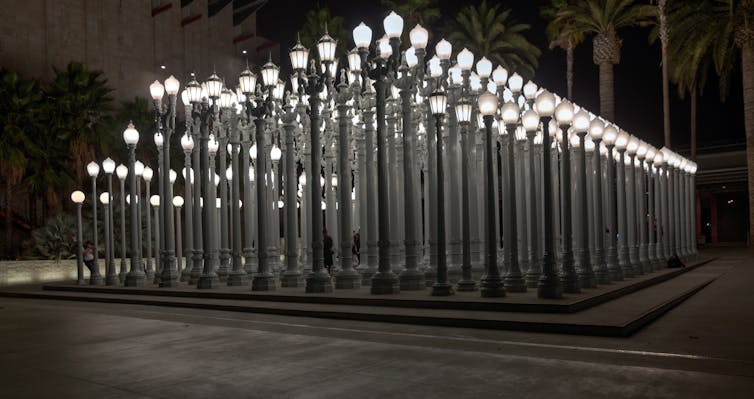Memilih jurusan kuliah tak bisa sembarangan. Semua harus disesuaikan dengan minat dan bakat yang dimiliki oleh calon mahasiswa. Tak hanya itu saja, calon mahasiswa juga harus melihat ke depan jika mengambil suatu jurusan kuliah maka apa prospek kerjanya nanti. Namun sebelumnya, calon mahasiswa harus menentukan jurusan kuliah apa yang akan diambil. Baru nanti memilih kampusnya.
Bagi yang tertarik kuliah Jurusan Ilmu Komunikasi, maka harus memahami apa itu ilmu komunikasi. Serta paham pekerjaan apa yang cocok dengan jurusan tersebut di masa depan. Saat dihubungi Kompas.com, Selasa (29/6/2021), Dosen Program Studi (Prodi) Ilmu Komunikasi Fakultas Psikologi dan Ilmu Sosial Budaya (FPSB) Universitas Islam Indonesia (UII) Dr. Subhan Afifi mengatakan, ada banyak pilihan karier bagi lulusan Ilmu Komunikasi.
“Sebenarnya, kuliah di Jurusan Ilmu Komunikasi ini cakupannya sangat luas. Jadi semua tergantung peminatan dan konsentrasi apa yang didalami ketika kuliah,” katanya. Dijelaskan, setiap kampus yang memiliki Program Studi Ilmu Komunikasi menawarkan konsentrasi atau peminatan yang berbeda-beda. Menurut Afifi yang juga sebagai Pemimpin Redaksi UII News, di Program Studi Ilmu Komunikasi UII, konsentrasi atau peminatan yang ditawarkan adalah: Public Relations, Media Kreatif, Kajian Media, dan Jurnalistik.
Di Prodi Ilmu Komunikasi biasanya masih terbagi menjadi beberapa konsentrasi lain. Berikut ini prospek kerja Ilmu Komunikasi:
1. Media dan Jurnalisme
Jika kamu lulus kuliah dari konsentrasi ini, banyak yang kerja sebagai: Jurnalis atau wartawan Reporter atau penyiar TV/radio. Selain itu Anda bisa juga berpeluang menjadi Jurnalis online, Analis media, Peneliti media, Fotografer, Wartawan media online.
2. Public Relations (PR)
Nantinya, jika kamu lulus kuliah, biasanya mahasiswa yang ambil konsentrasi PR akan berkarier sebagai: Hubungan masyarakat (humas) atau Public Relation Officer, Marketing, public relations, Humas pemerintahan
3. Broadcasting
Untuk konsentrasi broadcasting sendiri adalah dunia yang selalu menarik perhatian masyarakat. Adapun pilihan kariernya antara lain: Produser program TV/Radio, Content creator media online, Videografer, Youtuber, Filmmaker, Sutradara, Penulis skenario
4. Media kreatif
Ketika lulus kuliah dari konsentrasi ini, maka prospek kerja Ilmu Komunikasi dari media kreatif bisa menjadi: Content creator media digital, Entrepreneur media digital, Produser program TV, Film maker
5. Periklanan/advertising
Lulusan dari konsentrasi ini biasanya memiliki kemampuan kreatif di bidang periklanan/advertising. Adapun prospek kerja di industri periklanan sebagai: Copy writer, Designer grafis, Media planner, Account executive.
“Selain itu, lulusan Ilmu Komunikasi juga bisa menjadi PNS. Sebab, banyak instansi pemerintah pusat atau daerah yang membuka lowongannya untuk sarjana Ilmu Komunikasi,” ungkap Afifi. Dikatakan, para lulusan Jurusan Ilmu Komunikasi juga bisa jadi entrepreneur. Sebab, bidang komunikasi memang sangat banyak ragamnya. Terutama karena industri kreatif dan dunia kreatif saat ini berkembang sangat pesat di era disrupsi seperti sekarang ini.
Terlebih dengan masa pandemi ini, lulusan yang sudah terbiasa dengan teknologi, maka akan bisa membuka peluang usaha secara digital. Terlebih menjalankan bisnis online yang bisa dilakukan hanya dengan bantuan ponsel saja.
==========
Artikel ini telah tayang di Kompas.com dengan judul “Yuk Intip Prospek Kerja Ilmu Komunikasi”, Klik untuk baca: https://edukasi.kompas.com/read/2021/06/29/125424771/yuk-intip-prospek-kerja-ilmu-komunikasi?page=all.
Penulis : Albertus Adit
Editor : Albertus Adit
Artikel ini dimuat kembali untuk kepentingan edukasi dalam bingkai Rubrik Communication on Media: Prodi Ilmu Komunikasi UII dalam sebaran konten Media Massa.






